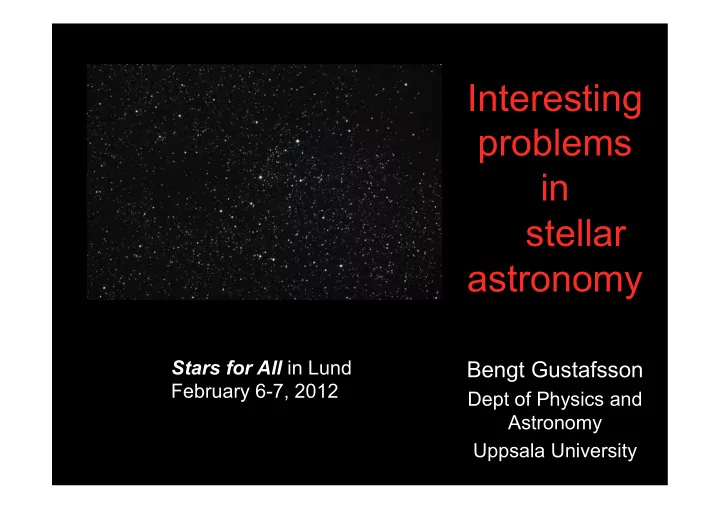

Interesting problems in stellar astronomy Stars for All in Lund Bengt Gustafsson February 6-7, 2012 Dept of Physics and Astronomy Uppsala University
The virtues of stars • Simplicity • Calculability • Separability • Observability • Multitude • Diversity, Ranges
Ex: ”Don’t we already know everything about Polaris?” Nancy R. Evans (Science 249; 2000) • 1832 – 1969: 82 papers with ”Polaris” in title • 1970 -- 1999: 79 papers • 2000 - 2011: 87 papers Cepheid, astrometric binary, Hipparcos parallax, interferometric diameter, dynamical mass: 4.5 M sun dP/dt = 4.5 ± 1.5 s/y. Evolution: > 15 s/y or < 1 s/y Mass loss? 10 -6 M sun /y (Neilson et al., 2012) X-ray and UV emission. Solves evolution/pulsational mass discrepancy?
” Interesting problems ” ? • for fundamental physics • … stellar physics • … interstellar medium physics • … planetary systems research • … Galactic astronomy • … galaxy research • … cosmology • … astrobiology • … climatology
Stars and fundamental physics • Solar energy source • Solar neutrino problem • Origin of the elements • Gravitational redshift, Double pulsar, Kerr metrics • Dynamical systems, structure formation? • Atomic and molecular physics
… stellar physics Massive stars : VLT-FLAMES survey (800 stars, Galaxy and MC:s) http://star.pst.qub.ac.uk/~sjs/flames/ Rotational mixing/binarity ??
Hunter et al. (2010)
… stellar physics Massive stars : VLT-FLAMES survey (800 stars, Galaxy and MC:s) http://star.pst.qub.ac.uk/~sjs/flames/ Rotational mixing/binarity ?? Magnetic fields? Formation? Mergers? Winds? Clumps? # of yellow supergiants? LBV eruptions? SNII explosions?
… stellar physics Solar-type stars: Formation (episodic accretion, fully mixed?) Magnetic field: origin, effects -- early, middle, late Activity ” Diffusion ” Angular momentum Late evolution: mixing, mass-loss Single star PNe? KEPLER, GAIA, Solar studies, …
Melendez et al. (2009) abundance vs cond. temp. Baraffe & Chabrier (2010); episodic accretion models
… stellar physics Red and brown dwarfs: Formation: IMF, Magnetic coupling disk/star Denis, 2MASS, SDSS: > 1000 brown dwarfs L, T, Y (300-500K). Magnetic activity: kgauss fields, different from solar Thunderstorms? Clouds in L atmospheres
Radigan et al. (2011)
… interstellar medium research Linked to massive stars, in particular radiation fields, winds, SNe
… planetary systems research Planet-host characterisation Santos et al. (2005) Considering stellar variability
… Galactic astronomy Bensby et al. ” … we speculate on the origin of the Bulge and must conclude that (2010) it is still poorly constrained. ”
… galaxy research Frebel (2011)
… cosmology • Li abundances in old stars - – Baryon content of the Universe • Globular-cluster ages – Cosmic acceleration, Dark energy • First stars – Reonization, galaxy formation
Spite & Spite (1982) Melendez et al. (2010)
Pont et al. (1998)
Frebel et al. (2008) Korn et al. (2009)
… astrobiology • Why are we here? C from AGB:s? Mixing, mass-loss
… astrobiology • Why are we here? C from AGB:s? Mixing, mass-loss N from more massive AGB:s?
… astrobiology • Why are we here? C from AGB:s? Mixing, mass-loss N from more massive AGB:s? O from SNII. Explosions?
… astrobiology • Why are we here? C from AGB:s? Mixing, mass-loss N from more massive AGB:s? O from SNII. Explosions? Sun any special?
… astrobiology • Why are we here? C from AGB:s? Mixing, mass-loss N from more massive AGB:s? O from SNII. Explosions? Sun any special? ” Faint-sun paradox ” ??
… astrobiology • Separating planetary spectra
… climatology • Solar variability • Solar activity • Solar wind, CME:s, …
Interesting problems? • There are some left
Interesting problems? There are some left FOR YOU !
Recommend
More recommend